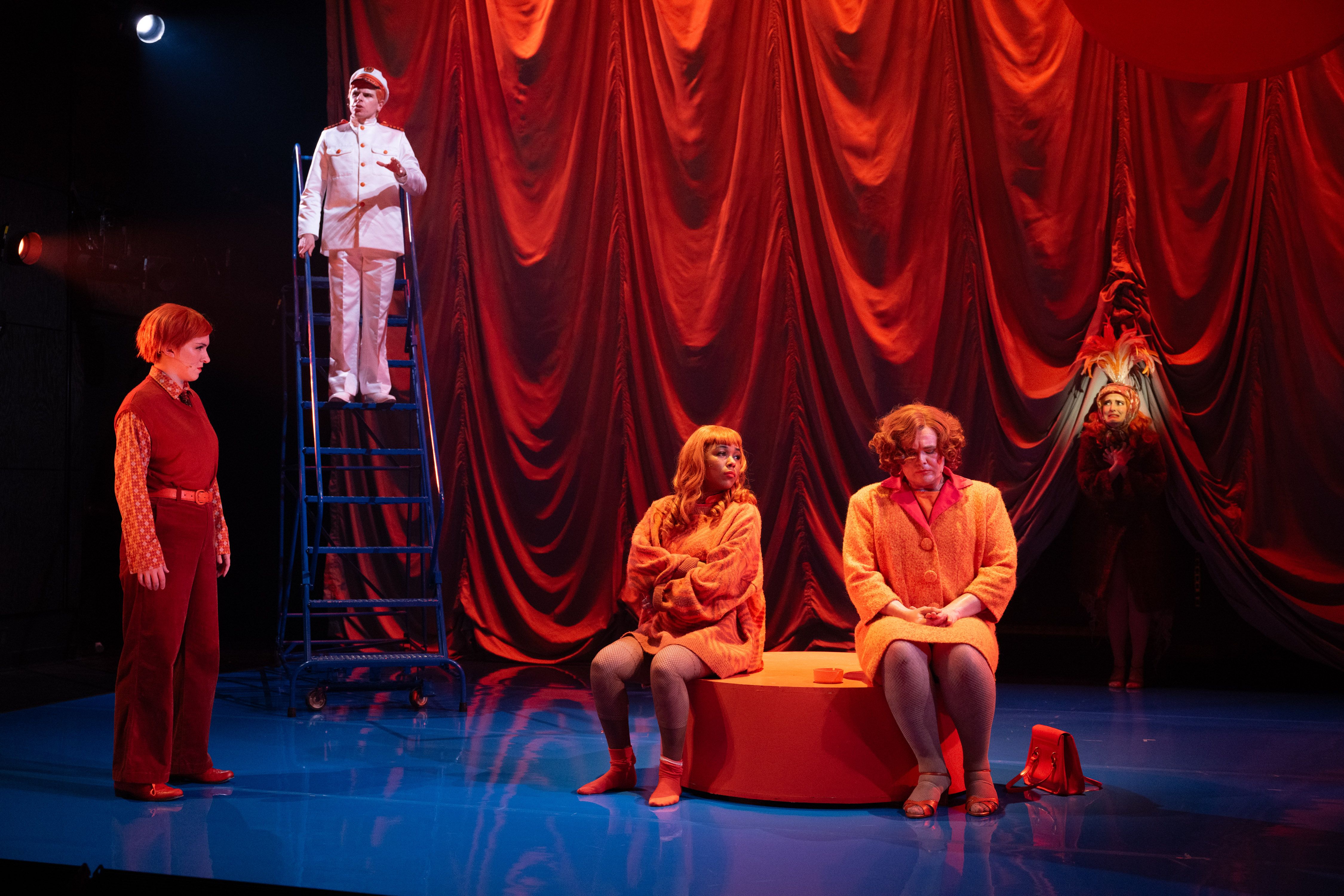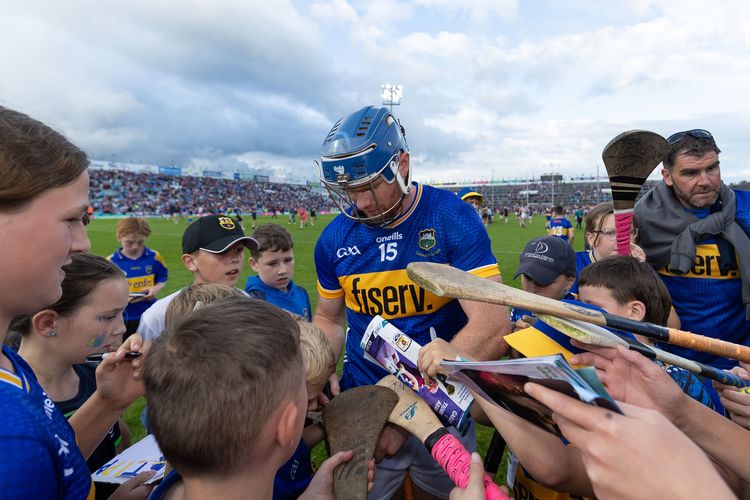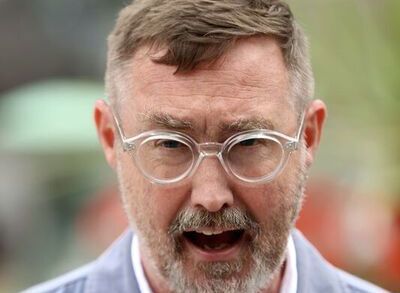The sins of our actions have come home to roost in a comedy that sets course for catastrophe, yet narrowly escapes its fate, raising controversial stakes and quelling the inevitable. In the anticipated arrival of Carys D. Coburn’s new play on American shores (before we’ve all submerged below sea level), and doubly desired U.S. premiere of Dublin-based theatre company Malaprop, debuts “Hothouse,” a provocative exposé on the calamity of climate change, directed by Claire O’Reilly at Irish Arts Center through Nov. 17.
Deceptively sincere, this production revisits the concept of crisis and human consequence of worldly proportions, with unabashed whimsy and severity alike, as tempers and temperatures flare.
In a refreshing departure from the presumed postmodern doom-scrolling that awaits a play about the end of times, “Hothouse” inhabits a curious hodgepodge of theatrical form and narrative, while steering toward genuine detours at opportune moments.
The story sets course aboard the “billion-dollar” cruise ship “Crystal Prophecy” embarked for the Arctic ice caps, led by the production’s showman (Peter Corboy), the cruise ship Captain—a charming protagonist equal parts Liberace and Dr. Seuss—who guides an ambivalent, guiltless audience to their destination: a vanished past; unrecoverable, haunting and annihilating. With little more than a ladder, striped deck chairs, a circular platform and the blazing wrath of the sun (design by Molly O’Cathain), we might otherwise be en route to a post-apocalyptic Oz: nothing behind the curtain, nothing left to hide.
In a vaudevillian hour and a half that is sometimes over-silly and at times profoundly moving, Coburn’s exquisitely odd foray into this Brechtian variety hour sets audiences adrift with intrusive thoughts of beguiling mortality, impossible ethical responsibilities, and an existential dilemma that may evoke Robert Frost, to be reborn by fire or dying in emotional ice.
The storyline floats on the recounted life of Ruth (Ebby O’Toole Acheampong), a 9-year-old living in the 15 Eircode of Dublin with mother (Thommas Kane Byrne) and father (Bláithín Mac Gabhann) in 1969, as told by the gingerly Captain. The story arch is something of a time capsule—for viewers who reminisce on the 60s, 70s, 80s, even 2011—as histories and pop culture converge into a shared culpability. “Silent Spring” author Rachel Carson (Maeve O’Mahony) even makes a trite yet compassionate cameo.
In peculiar storybook speak, the Captain annotates the abusive events in Ruth’s life over the years, and attributes each year to the subsequent extinction of several species of birds. This seemingly flippant detail is made poignant by the Captain—that few of us have ever heard these birds, let alone will mourn their cry.
The show strives early on to make the connection, if not clumsily, between the result of environmental desolation and the compiled remorse of familial faltering—the irreparable damage each causes and is caused. It might have done so had the play’s first half not gone overboard attempting to win over audiences with gawky pizzazz and calculated theatrical antics.
As the Captain prepares us for things to “get weird,” Malaprop’s first arrival in Manhattan perhaps has not anticipated just how “weird” New York audiences already are. When the zany lead-in turns out to be a Ziegfeld bird (Maeve O’Mahony) singing an a capella timeline of her ancestors’ sex lives, it met with the likeliness that half the audience already heard a similar tune on the way through Washington Square Park, and other half have the remix on their Spotify. The shock and awe is left unremarked.
Nor was this audience bemused by the show-within-a-show’s gussied up camp; regardless to whether Coburn’s sharply crafted sarcasm is ultimately entertaining. Silence fell where the self-effacing laughs should have been. The audience is caught in the joke, however; we want to skip the cheap thrills in favor of the substantial.
The show’s swaying focus has yet to find its sea legs throughout the play’s multiplicitous narrative, yet misses hitting the rocks as the production’s latter half picks up steam. While the hybrid play-musical of “Hothouse” is commonplace to many recent Irish works (music and stunning sound design by Anna Clock; choreography by Deirdre Griffin and Paula O’Reilly), and the voice and movement of the actors are considerably exceptional, it perhaps veers too deliberately into distracting spectacle. Only at the moment this production does away with its own false pretenses does it become its most visceral, and worthwhile.
Carys D. Coburn delivers their most refined dialogue to date in “Hothouse,” as their innate, natural banter, ever-superb, lightning-in-a-bottle prose and exasperating intellect on the page met their decisive match in this latest play, with scenes as complexly ingenious as they are emotionally daring.
Coburn uncovers new angles to redefine the conversation of crisis in expressions that are all-pertinent to our times, in tones that, though not enough to soften the blow of inner devastation, consoles it. An unforgettable scene is staged between Ruth’s adult daughter (O’Mahony) and her would-be lesbian infatuation (Mac Gabhann) on the deck of the “Crystal Prophecy.” As the two lonely orphans stand listlessly apart, indulging the morbid hypothetical of why to go on when one’s fate has been sealed by the actions of all before you, and whether that fact alone is truly fate—in Coburn’s commerce of words— is utterly eviscerating, pierces through beyond compare, and etches into every memory.
Psychoanalyses do abound, and the eventual recurrence of parental blaming may shed some fatiguing tears, yet “Hothouse” gives rise to more than just the oceans, and the play’s questions of personal, vital emergency get to the heart of something deeply instilled in our worldly pessimisms: our anxieties of inadequacy perpetuate our paralysis. In a way that fascinates, Coburn has written a play about forgiving and of retrospect, one that pardons a past we can never predict, as much as it is a futuristic view that indeed eschews doom.
As something that confronts soberly the harshness of generational trauma, this work is a voice timely as ever to say “the end” is but an end as any other; our actions are merely the reaction to prior actions. It is painfully easy to look back with regret, of what should have been done; to choose to live and fail, than lie lifeless and sink. Harder still to do with what you have, and face the rising tide.
“Hothouse” may remain afloat, adapt and endure.
For tickets, visit irishartscenter.org.









